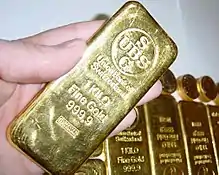bullion
English

gold bullion
Etymology
From Middle English bulloin, bullioun, from Anglo-Norman bullion, of obscure origin, perhaps from French bouillon, extending the sense to that of 'melting'. Middle Dutch boelioen (“base metal”) seems to have come from the unrelated French billon.
Pronunciation
- IPA(key): /ˈbʊl.jən/
Noun
bullion (countable and uncountable, plural bullions)
- A bulk quantity of precious metal, usually gold or silver, assessed by weight and typically cast as ingots.
- (obsolete) Base or uncurrent coin.
- Sylvester
- And those which eld's strict doom did disallow, / And damn for bullion, go for current now.
- Sylvester
- (obsolete) Showy metallic ornament, as of gold, silver, or copper, on bridles, saddles, etc.
- Skelton
- The clasps and bullions were worth a thousand pound.
- Skelton
- (obsolete) A heavy twisted fringe, made of fine gold or silver wire and used for epaulets; also, any heavy twisted fringe whose cords are prominent.
Part or all of this entry has been imported from the 1913 edition of Webster’s Dictionary, which is now free of copyright and hence in the public domain. The imported definitions may be significantly out of date, and any more recent senses may be completely missing.
(See the entry for bullion in Webster’s Revised Unabridged Dictionary, G. & C. Merriam, 1913.)
Translations
bulk quantity of precious metal
This article is issued from Wiktionary. The text is licensed under Creative Commons - Attribution - Sharealike. Additional terms may apply for the media files.